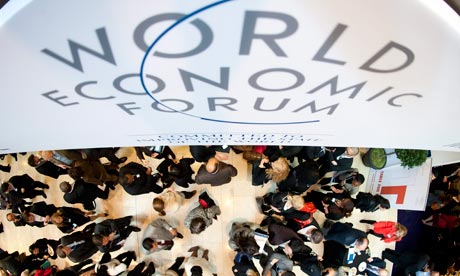Larry Elliott in Davos
guardian.co.uk, Wednesday 25 January 2012 20.22 GMT
While the World Economic Forum's members sense all is not well with the world, they don't seem to be doing anything about it
Participants at the 42nd annual meeting of the World Economic Forum in Davos. Photograph: Laurent Gillieron/AP
Before it became famous as the annual gathering place of the leaders of globalisation, Davos was where the well-heeled came to treat their TB. Last night Klaus Schwab, the man who set up the World Economic Forum in the 1970s, said the resort was in a sense reverting to its former use. "Davos will be the sanatorium for the world for the next five days," he said.
His remark summed up the mood at this year's gathering. There is a recognition that all is not right with the world. But after four years of stop-start recovery, rising unemployment, austerity, sovereign debt crises and growing social unrest, you don't need an eight-digit salary to work that out. What there isn't, is a plan for getting out of the mess, or even much of a desire on the part of those doing very nicely out of the current system to start drafting one.
As such there are plenty of doom-laden sessions in which panellists are asked whether the capitalism of the 20th century is failing 21st century society.
Schwab said that companies must constantly reinvent themselves and become socially responsible. The message he wanted the meeting to send out to the Occupy protesters huddling in their igloos was that Davos "gets it". But it doesn't: not really.
Whether by irony or not, the theme for this year's meeting is the Great Transformation, also the title of a famous critique of 19th century capitalism by Karl Polanyi, in which the argument was that the first stab at capitalism red in tooth and claw was utopian and unsustainable. The second attempt at a pure laissez-faire model, which became possible after the collapse of eastern bloc communism, has now run into problems too, as Polanyi would no doubt have predicted.
But most of those in Davos do not want to hear from trade unionists warning that capitalism will eat itself if workers are unable to buy the products they produce, if inequality is allowed to run unchecked, if global unemployment remains stuck at 200 million and ordinary taxpayers are forced to pay for the sins of the banks through blanket austerity programmes.
The sense among the chief executives is that income inequality is rather like the blizzard that has been raging in the high alps for the past week – a force of nature that cannot be controlled. This, though, was precisely Polanyi's point. He said laissez-faire capitalism was a political construct that had been shaped by those in power.
Ben Verwaayen, the chief executive of Alcatel-Lucent, said people should stop being nostalgic because there was no going back to the old world. Shape up, embrace change, get with the globalisation programme: that was his answer to those angry at corporate excesses, job insecurity, offshoring and banks deemed too big to fail.
That sort of talk failed to impress Amadeus Thiemann, an engineer from Zurich who was one of the protesters outside the Davos ring of steel. "We believe that the leaders of the World Economic Forum are just trying to implement new systems to maximise their profits, not to help the world."
Nor did it impress all those on the inside either. Salil Shetty, the London-based secretary general of Amnesty International, warned of "explosions" of people furious at the inequalities. "The biggest risk" was failed leadership, said Shetty. "Seems as if they've been sleeping at the wheel".
Peter Mandelson, meanwhile, was punting the need for a globalisation with the rough edges knocked off, a sort of third-way globalisation to "reduce the costs and ills [of the system] including the wide income disparities that have been generated over the last decade or so".
According to the former business secretary, the world is going through the third wave of globalisation, following the British-dominated model between 1870 and 1914 and the American-led system that emerged at the end of the second world war. Germany was the exemplar of the people-centric model of globalisation that was needed, he added.
With signs that this year's presidential elections in the United States and France will be coloured by increasingly isolationist and protectionist language, Mandelson said the economic crisis of the past four years could easily spill over into a strong anti-globalisation movement, which he said would have baleful consequences.
He said: "If we start closing markets or blocking trade, the prospects are that we would be pushed further into the downward economic spiral that we are in already."
Even stronger warnings came from a Davos old-stager, the investor George Soros, who stressed the self-defeating nature of the austerity being pushed on Europe by Angela Merkel, predicting that the inevitable result would be a Greek default, contagion, a vortex of economic failure and social unrest and eventually a threat to the European Union itself.
When she gave the opening address a couple of hours later, the German chancellor was nothing like as quotable – or as interesting. Her low-key speech stressed the need for budgetary discipline, competitiveness and solidarity. Bit by bit, Europe was getting there, Merkel said, even though the progress was perhaps not fast enough.
Her goal appears to be a United States of Europe, with the European commission acting even more like a government than it does now. David Cameron, who gives a keynote address on Thursday, may have a few problems with that.
Europe spent much of the last 12 months in denial about the extent of its problems. The same could be said of Davos, where a poll of chief executives a year ago predicted that 2011 would be a golden year. Instead, it was a stinker, at least for countries in the developed world.
Will 2012 be any different? On the evidence so far, fat chance.
Davos: a sanatorium for those in denial of capitalism's ills | Business | The Guardian

